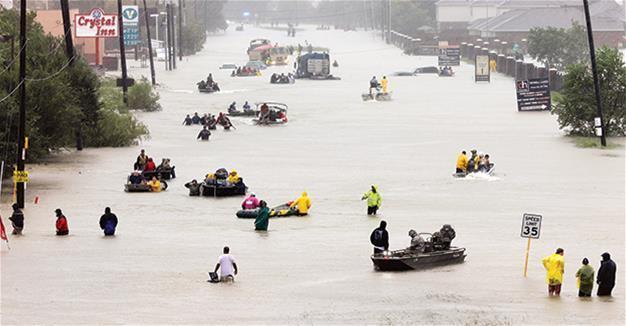‘Harvey’ brings death, destruction to Houston
HOUSTON - Reuters
 Floodwaters from Tropical Storm Harvey are likely to rise as more torrential rain pounds the U.S. Gulf Coast, where at least eight people have already been killed in Texas and tens of thousands driven from their homes, officials have said.
Floodwaters from Tropical Storm Harvey are likely to rise as more torrential rain pounds the U.S. Gulf Coast, where at least eight people have already been killed in Texas and tens of thousands driven from their homes, officials have said.Thousands of National Guard troops, police officers, rescue workers and civilians raced in helicopters, boats and special high-water trucks to rescue the hundreds stranded in the catastrophic storm that has crippled Houston, the nation’s fourth-largest city.
Harvey has already dumped more rain in the past few days than some affected areas normally see in a year.
The storm was the most powerful hurricane to strike Texas in more than 50 years when it hit land on Aug. 25 near Corpus Christi, 354 kms southwest of Houston. The worst is far from over because the slow-moving storm will continue to dump rain over the next few days in an area hit by “unprecedented” flooding, the National Weather Service said.
“Additional heavy rainfall overnight is expected to worsen the flood situation in southeastern Texas and southwestern Louisiana,” the National Hurricane Center said.
Forecasts show that some spots in and around Houston could see an additional 30 cms of rain yesterday, bringing the total rainfall from Harvey to about 127 cms in parts of the city’s metro area.
U.S. President Donald Trump was to go to Texas yesterday to survey the damage and might also visit Louisiana, where the storm is now dumping rain.
Trump, facing the biggest U.S. natural disaster since he took office in January, has signed disaster proclamations for Texas and Louisiana, triggering federal relief efforts.
Among the most recent fatalities from the storm was a family that included two adults and four children who were believed to have drowned after the van they were in was swept away by floodwaters in Houston, authorities said on Aug. 28.
In scenes evoking the aftermath of Hurricane Katrina in 2005, police and Coast Guard teams have each rescued more than 3,000 people, plucking many from rooftops by helicopter, as they urged the hundreds more believed to be marooned in flooded houses to hang towels or sheets outside to alert rescuers.
Schools and office buildings were closed throughout the metropolitan area, home to 6.8 million people, as chest-high water filled some neighborhoods in the low-lying city.
The Federal Emergency Management Agency director Brock Long estimated that 30,000 people would eventually be housed temporarily in shelters.
Both of Houston’s major airports were shut, along with most major highways, rail lines and a hospital, where patients were evacuated over the weekend. More than a quarter of a million customers in the region were without power by Aug. 28 evening, utilities said.
The Brazos River was forecast to crest at a record high in the next two days about 50 kms southwest of Houston, forcing the mandatory evacuation of about 50,000 people in Fort Bend County, where officials described the predicted deluge as the worst in at least eight centuries.
Rising river and reservoir levels also forced evacuations in the counties of Brazoria and Galveston, near Houston.
















